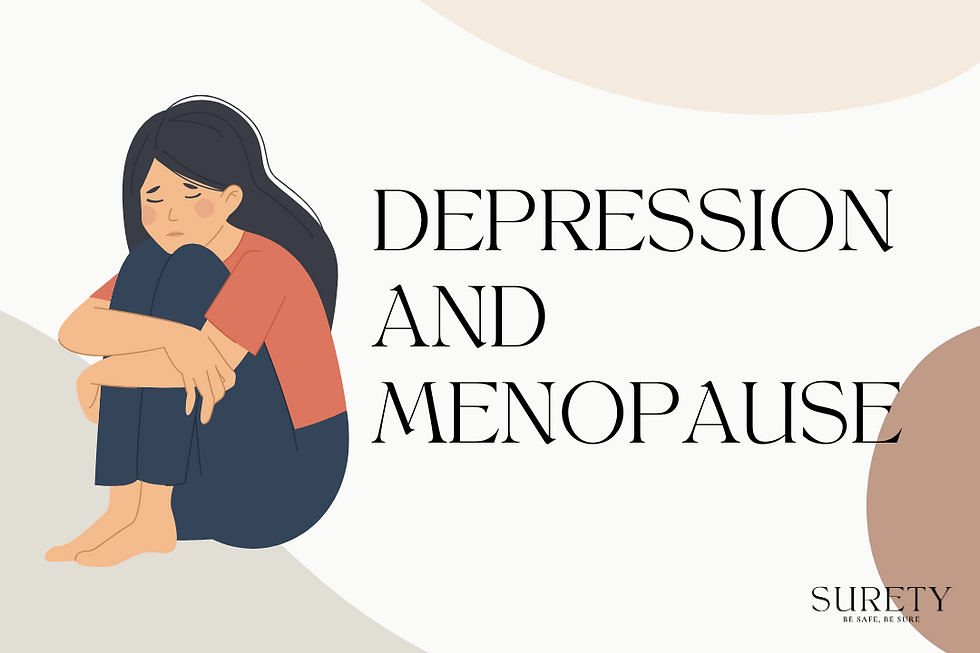#MenoWellness: Depressive thoughts during menopause? More normal than you think!
- Team Surety

- Jun 28, 2023
- 3 min read
Updated: Feb 25, 2025
Reviewed by Irisha (BA Psychology, Hons), Kwang Yong (Counselor-in-Training), Joyce (Counselor-in-Training) from A Kind Place

The world, and Singapore in particular, is experiencing a severe epidemic of mental illness. Out of the 5,725 adults, 14.1% were reported to have symptoms consistent with depression and 15.2% have symptoms consistent with anxiety in 2022. Additionally, studies have shown that the risk of experiencing depressive symptoms increases with the onset of menopause.
Yet, one lesser known fact about depression, especially in older adult women, is that menopause could really affect one's outlook on life. Not directly, but indirectly, through one's hormonal changes, physical symptoms and psychological distress as caused by the aforementioned symptoms in general.
However, individual differences and the severity and duration of depression symptoms may vary for women experiencing menopause. Women from different cultural background may experience different symptoms and severity.
As such, understanding the relationship between menopause and depression is crucial to support women during this transition. In this article, we will explore FIVE key points that shed light on the connection between menopause and depression.
ONE: Hormonal Fluctuations
During menopause, a woman's ovaries gradually produce fewer hormones, particularly estrogen and progesterone. These hormonal changes can have a significant impact on neurotransmitters in the brain.
One such neurotransmitter, serotonin, plays a crucial role in regulating mood. With the decline in estrogen level, there is a disruption in the balance of neurotransmitters, triggering symptoms of depression.
TWO: Deleterious effects of Menopause’s symptoms
Due to the above point, women undergoing menopause are at a higher risk of developing depression compared to their pre-menopausal counterparts.
Additional contributing factors are: personal and family history of depression, previous episodes of depression, and psychosocial stressors.
Additionally, studies have shown that the risk of experiencing depressive symptoms increases with the onset of menopause, which is all the more a cause for concern.
THREE: Chronic Nature
Menopause is often accompanied by a range of physical symptoms, such as hot flashes, night sweats, sleep disturbances, and fatigue. These symptoms can disrupt daily routines, affect sleep quality, and contribute to overall distress.
These symptoms can lead to frustration, irritability, and decreased quality of life, which can further contribute to the development of depressive symptoms.
FOUR: All of these can and WILL contribute to a DECLINE in Mental Well-Being
One constantly overlooked symptom of menopause is that it may also bring changes in body composition, including weight gain and alterations in fat distribution. These changes, coupled with societal expectations and cultural influences, can negatively impact a woman's body image and self-esteem.
Especially in our Eastern society where an emphasis is placed on looks, women may therefore experience feelings of dissatisfaction and distress with regards to their appearance.
These contribute to a decline in mental well-being and increase the risk of depression. It is therefore important for family and friends to look out for the well-being of the person going through menopause by providing social support and companionship!
FIVE: Social Support and Education
Studies have shown that having a supportive social structure and educating yourself can significantly help one cope with depression.
Open conversations with healthcare providers, friends, and family members can help women gain a better understanding of the emotional challenges associated with menopause.
In addition, support groups and/or counseling can provide a safe space for sharing experiences and learning coping strategies. Additionally, lifestyle modifications such as regular exercise, a balanced diet, stress management techniques, and relaxation exercises can contribute to improved mental health during this transition.
SIX: Midlife Issues
With the many responsibilites that come with being middle-aged, such as marital issues, caregiver changes (examples include aging parents and managing finances), aging issues, and career responsibilities, all of these pile up and can worsen symptoms of depression that come with menopause too!
What are the symptoms to look out for:
Are you in a depressed mood most of the day
Lost of interest or pleasure in daily activities which you usually enjoy
Additional symptoms can include:
Decrease self-esteem, Increase isolation, Increase anxiety
Fatigue or lack of energy
Disturbances in sleep, too much or too little
Decrease sexual interest
Problems in cognition - memory, concentration, paranoia
But... NO WORRIES...
Menopause is a natural and transformative phase of a woman's life, but it can also be accompanied by emotional challenges, including an increased risk of depression.
Understanding the connection between menopause and depression can help women and their support networks recognize and address the emotional well-being needs during this time.
By prioritizing open communication, seeking social support, and implementing healthy lifestyle choices, women can navigate menopause with improved mental and emotional resilience.
Important Notes:
This article is meant purely for informational purposes and should not be relied upon as medical advice. Always consult a medical professional for specific advice on your health.
References:
menopause_guide.pdf (womensmentalhealth.org)
Perimenopausal depression – an under-recognised entity - Australian Prescriber (nps.org.au)

